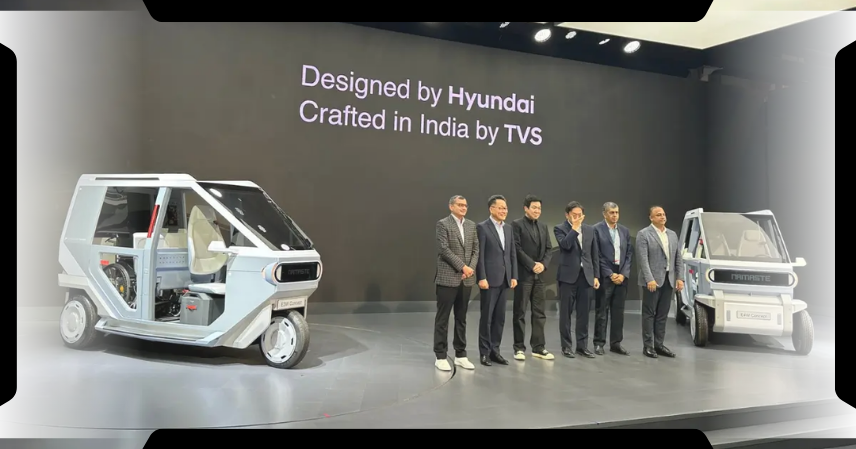In a significant move towards sustainable urban transportation, TVS Motor Company and Hyundai Motor Company have announced a strategic collaboration to develop electric micro cargo vehicles tailored for the Indian market. This partnership aims to address the growing demand for efficient last-mile delivery solutions in India’s bustling cities.
Overview of the Collaboration
At the Bharat Mobility Global Expo 2025, both companies unveiled concept models of advanced electric three-wheelers (E3W) and micro four-wheelers (E4W). These vehicles are designed to cater to the unique challenges of urban logistics, offering compact dimensions, zero-emission powertrains, and enhanced maneuverability.
Hyundai brings its global expertise in design, engineering, and technology, while TVS contributes its deep understanding of the Indian market, manufacturing capabilities, and extensive distribution network. Together, they aim to redefine last-mile connectivity in India.
Key Features of the Electric Micro Cargo Vehicles
1. Compact and Efficient Design
The E3W and E4W concepts are designed with a focus on compactness, allowing them to navigate narrow city streets and congested traffic with ease. Their small footprint makes them ideal for last-mile delivery services in urban areas.2. Zero-Emission Powertrain
Both vehicles are powered by electric drivetrains, contributing to reduced air pollution and aligning with India’s push towards cleaner transportation solutions.3. Versatile Cargo Solutions
The cargo area is designed to accommodate various types of goods, making these vehicles suitable for a range of industries, including e-commerce, food delivery, and logistics.4. Advanced Safety Features
Safety is a priority, with features such as reinforced chassis structures, improved braking systems, and enhanced visibility for drivers.5. Driver Comfort and Ergonomics
The cabin is ergonomically designed to reduce driver fatigue, featuring comfortable seating, intuitive controls, and climate control options.
Market Potential and Impact
India’s rapid urbanization and the exponential growth of e-commerce have led to increased demand for efficient last-mile delivery solutions. Electric micro cargo vehicles offer a sustainable alternative to traditional internal combustion engine vehicles, reducing operational costs and environmental impact.
By entering this segment, TVS and Hyundai aim to capture a significant share of the urban logistics market, providing businesses with reliable and eco-friendly transportation options.
Future Outlook
While the concept vehicles have been unveiled, both companies are conducting feasibility studies and market analyses to refine the designs and assess production viability. The collaboration signifies a step towards achieving India’s goals for electric mobility and sustainable urban development.
FAQs
Q1: What are the main objectives of the TVS and Hyundai collaboration?
A: To develop electric micro cargo vehicles that address the challenges of last-mile delivery in urban India, combining Hyundai’s technological expertise with TVS’s market knowledge.
Q2: When were the concept vehicles unveiled?
A: The electric three-wheeler and micro four-wheeler concepts were showcased at the Bharat Mobility Global Expo 2025.
Q3: What are the benefits of electric micro cargo vehicles?
A: They offer zero-emission transportation, lower operating costs, ease of navigation in congested areas, and suitability for various cargo types.
Q4: Are there any details on the production timeline?
A: As of now, both companies are in the exploratory phase, conducting studies to determine the feasibility and potential timelines for production.
Q5: How does this collaboration align with India’s EV goals?
A: It supports the country’s push towards electric mobility, aiming to reduce carbon emissions and promote sustainable transportation solutions.
This partnership between TVS and Hyundai marks a significant step towards revolutionizing urban logistics in India. By focusing on electric micro cargo vehicles, they aim to provide sustainable, efficient, and cost-effective solutions for last-mile delivery challenges.

